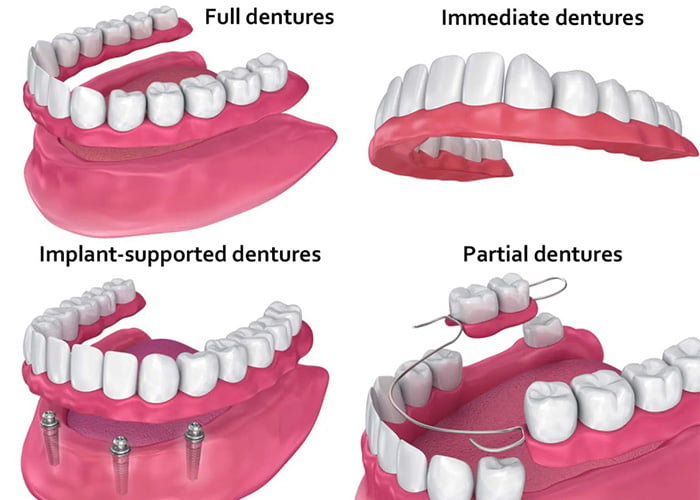Determining which denture type is right for you will depend on various factors, including the number and location of missing teeth, the condition of your gums and jawbone, your budget, and your personal preferences.
A comprehensive dental exam and consultation with a dentist or prosthodontist is the best way to determine which denture type is appropriate for your specific needs. They will evaluate your oral health, discuss your treatment goals and budget, and recommend the best option to meet your unique needs.
Learn more about the different kinds of dentures
There are several different denture types available, each with its unique benefits and drawbacks. Here are some of the most common types of dentures:
Full dentures
Full dentures are designed to replace all of a person’s natural teeth. These dentures are typically made from acrylic and are custom-fitted to the patient’s mouth. Full dentures can be either conventional or immediate. Conventional dentures are made after the teeth have been removed and the gums have healed, while immediate dentures are made in advance and can be placed immediately after the teeth are removed.

Partial dentures
Partial dentures are a denture-type prosthetic that is designed to replace one or more missing teeth. They are made from acrylic and metal and are custom-fitted to the patient’s mouth. They are held in place by clasps or clips that attach to the remaining natural teeth and can help prevent further damage to the remaining teeth and improve a patient’s ability to eat, speak, and smile.
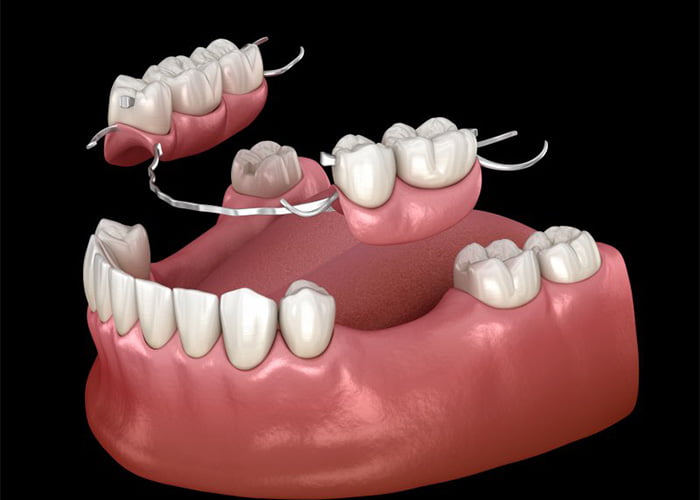
Temporary dentures
Temporary dentures, also known as immediate dentures, are a denture-type prosthesis that is designed to be worn for a short period while the patient’s permanent dentures are being made. They are made from a softer material than permanent dentures and may not fit as well, but they can be a good option for patients who do not want to be without teeth while waiting for their permanent dentures.
Temporary dentures are denture-type prostheses designed to be worn for a short period while the patient’s permanent dentures are being made. They can help maintain their appearance and avoid the embarrassment of missing teeth, but they are not a long-term solution and may not be as comfortable or functional as permanent dentures.
Read more: Why do my dentures cutting into the gums?
Flexible dentures
Flexible dentures are denture-type prosthesis that is designed to be more comfortable and aesthetically pleasing than traditional dentures. They are made from a thermoplastic material that is thin, lightweight, and flexible, and can be colored to match the patient’s natural teeth. They can be held in place by clasps or clips, or suction, and are more comfortable to wear due to their conformability to the patient’s mouth, reducing the risk of irritation and sore spots.
Flexible dentures are denture-type prosthesis that is designed to be more comfortable and aesthetically pleasing than traditional dentures However, they may not be as durable as traditional dentures and may not provide the same level of support for the remaining natural teeth.
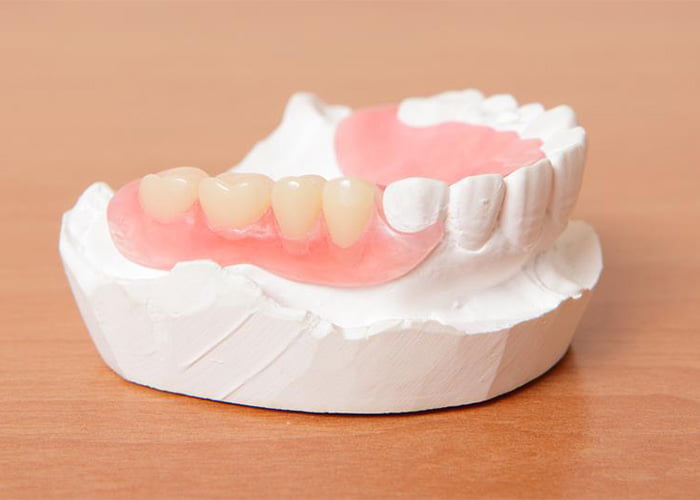
Fixed bridge
A fixed bridge is a denture-type prosthesis used to replace one or more missing teeth. It consists of a series of dental crowns that are attached to the remaining natural teeth or dental implants on either side of the gap. It can help to restore the function of the mouth, improve the patient’s ability to eat and speak and prevent further dental problems.
Fixed bridges are also designed to look and feel like natural teeth, and can be made from a variety of materials to match the patient’s appearance and boost their confidence.
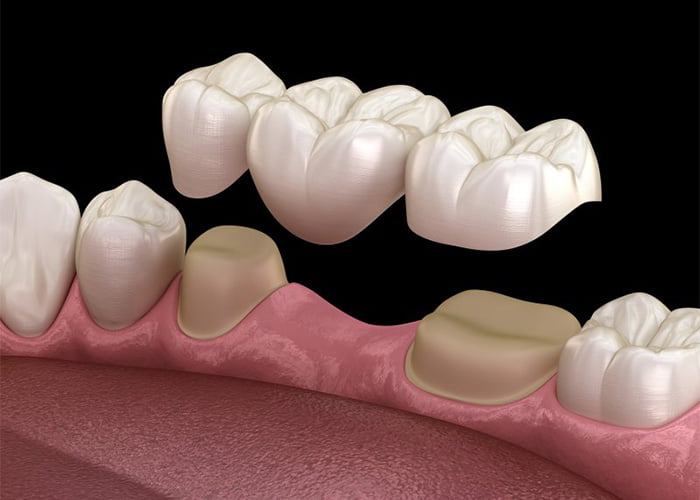
Cantilever bridge
A cantilever bridge is a denture-type prosthesis that is used to replace one or more missing teeth. It works by attaching a dental crown to only one side of the gap, rather than both sides as in a traditional fixed bridge. It can be a good option for patients who have a gap that is located at the back of the mouth, as it only requires support on one side.
Additionally, it can help to restore the function of the mouth and prevent further dental problems. However, it may not be the right option for everyone due to its only being stable and placing more stress on the remaining natural teeth or dental implants.
Read more: How Much Do Dentures Cost in 2023?
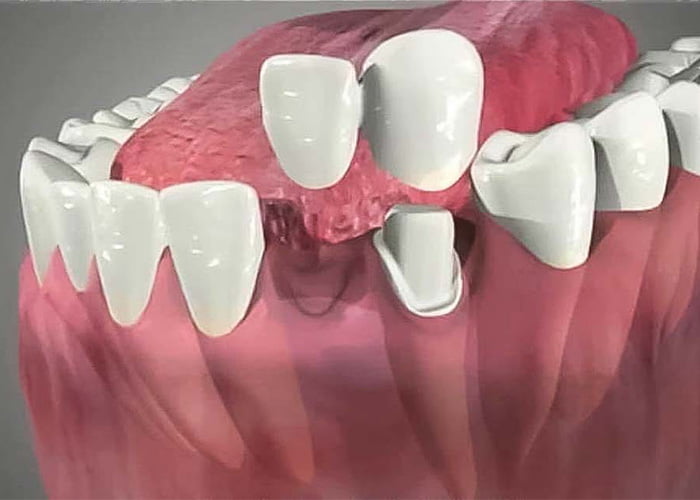
Implants
Dental implants are artificial tooth roots made of biocompatible materials such as titanium that can fuse with the surrounding bone tissue to create a stable and durable foundation for replacement teeth. The process involves evaluating oral health, surgically placing the implant into the jawbone, and osseointegration to attach the replacement tooth or dental bridge.
Dental implants are artificial tooth roots that are used to support replacement teeth or dental bridges. They provide a stable and durable foundation for replacement teeth and help to preserve the surrounding bone tissue, but they are not suitable for everyone and require a commitment to good oral hygiene and a lengthy process to complete.
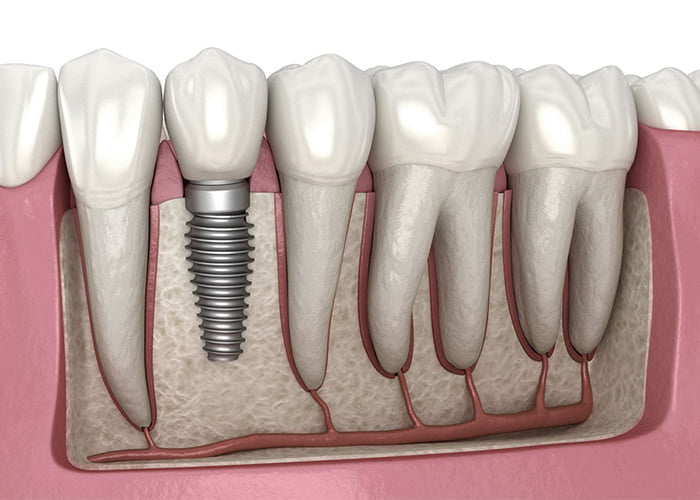
Implant-supported fixed dentures
Implant-supported fixed dentures are denture-type restoration that combines dental implants with a fixed bridge to replace multiple missing teeth. The process involves evaluating oral health, surgically placing the implants into the jawbone, and osseointegration to form a stable and durable foundation for the fixed bridge. The final step is attaching the fixed bridge to the implants.
Implant-supported fixed dentures are denture-type restoration that combines dental implants with a fixed bridge to replace multiple missing teeth. They provide a stable and natural-looking solution for missing teeth, but are not suitable for everyone and require a commitment to good oral hygiene and a lengthy process to complete.
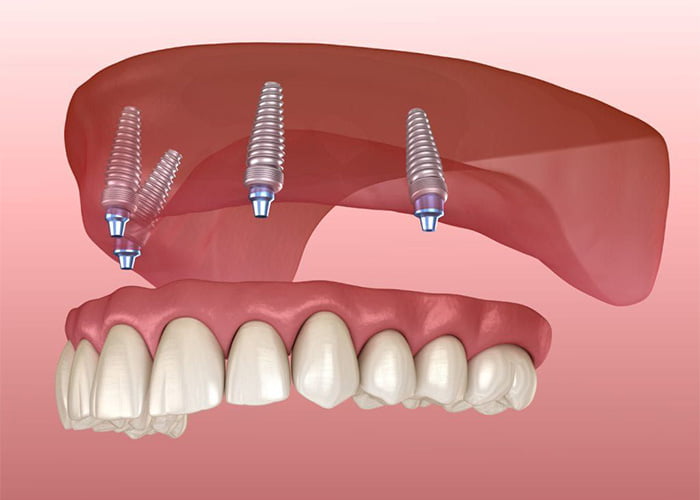
Snap-on dentures
Snap-on dentures are a denture-type restoration that combines dental implants with a removable denture to replace multiple missing teeth. The process involves evaluating oral health, surgically placing the implants into the jawbone, and osseointegration to form a stable and durable foundation for the denture. The final step is attaching the denture to the implants.
They offer a stable and comfortable fit that eliminates messy adhesives and help to preserve the surrounding bone tissue. However, they are not suitable for everyone and require a commitment to good oral hygiene and a lengthy process to complete.
Choosing Your Best Fit
Choosing the best denture type for your needs depends on several factors, such as the number of missing teeth, the condition of remaining teeth, your oral health, and your personal preferences. Full dentures may be the best option, partial dentures may fill in the gaps, temporary dentures can be a good option, flexible dentures are a more comfortable and natural-looking option, and fixed bridges or implant-supported dentures are better options.
When choosing your dentures, it is important to consider factors such as comfort, durability, and ease of maintenance. Consult with a qualified dentist to make an informed decision and enjoy a healthy, beautiful smile that enhances your overall health and well-being.
Contact Us Today
Regular dental care is essential for maintaining healthy teeth and gums, preventing oral health problems, and ensuring your smile looks and feels its best. At Dentist for Life, our experienced team of dental professionals is dedicated to providing comprehensive, personalized care to meet the unique needs of each patient. If you are looking for a trusted dental provider in your area, contact Dentist for Life today to schedule your appointment. We look forward to helping you achieve optimal oral health and a beautiful, confident smile for life.

